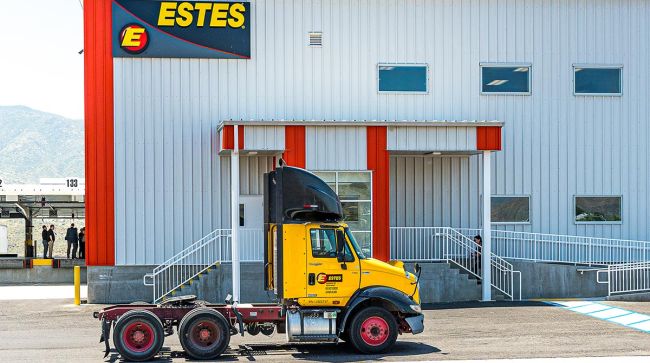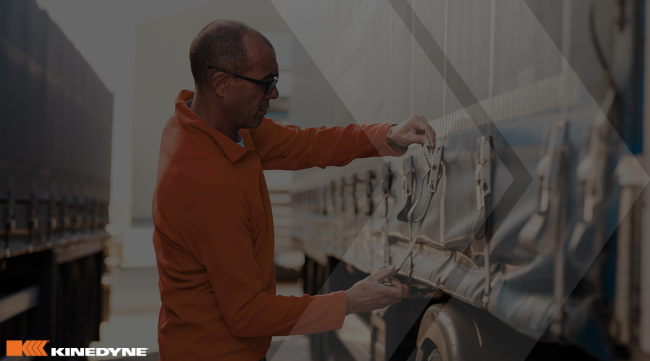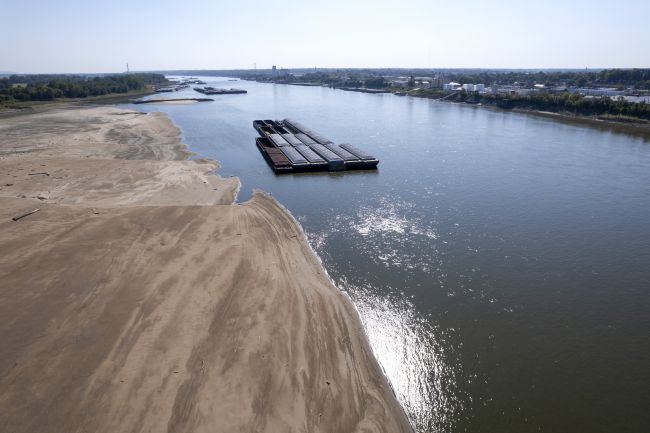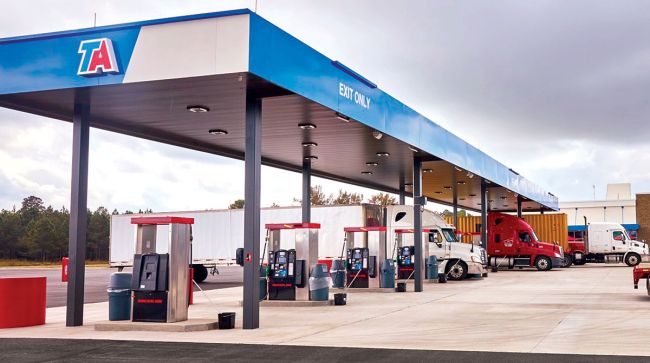Estes’ new facility in Banning, Calif. (Ed Tyler Photography)
Estes Express Lines took a major step in its expansion and sustainability initiatives with the opening of a new terminal in Banning, Calif., the carrier announced May 26.
The new terminal has been in development since the carrier first purchased the land in 2018. It spans 39 acres, features 133 doors and has a three-bay shop.
The Richmond, Va.-based privately owned freight carrier has more than 250 locations across the country. Estes Express Lines ranks No. 12 on the Transport Topics Top 100 list of the largest for-hire carriers in North America.
“Ultimately, one of the things that you cannot find in Southern California is land,” Webb Estes, president and chief operating officer at Estes Express Lines, told Transport Topics. “Land comes at a premium. In fact, we have two other facilities in Southern California that have as many doors as our Banning, California, terminal does. But the Banning facility has more land than those two terminals combined.”

The facility uses all-electric forklifts. (Ed Tyler Photography)
Webb Estes stressed the importance that having space has on operations, especially with how congested land development can get in the area. He noted the terminal isn’t just going to allow his company to gain more business, it’s also going to provide a lot of flexibility when it comes to the ebbs and flows of the local freight market.
“We actually have land to park trailers and be more flexible in that regard, which is incredibly important,” Estes said. “California has its busy seasons and slow seasons and there’s different times of year where there’s a ton of freight coming in from the ports and it can be really hard as a trucking company to navigate the ebbs and flows of equipment.”
Estes noted the facility was built with anticipated future growth in mind instead of just trying to catch up on current demand. He has heard a lot of talk about the ports slowing down but he believes that there is going to be ample opportunity to leverage the new facility to grow the business.

There are eight electric tractors on site. (Ed Tyler Photography)
“We talked about building an 80-door terminal or a hundred-door terminal, and we just kind of said it’s going to be OK if we have a little too much capacity in Southern California,” Estes said. “Like that will be a good problem to have. One of my rallying cries has been, we want to find a way to say yes to the customer. And that means looking at problems differently. That means having our teams ready to go. But it also means having the capacity.”
The Banning terminal is a major step in efforts by the carrier to expand its network. That has included purchasing seven facilities when Central Freight Lines went out of business in December 2021. The carrier has since reopened most of those locations, including what is now its largest facility near Fort Worth, Texas.
“We more than quadrupled our capacity in San Antonio, we more than doubled our capacity in one of our Dallas facilities,” Estes said. “Obviously, we’re very excited about Southern California and the opportunity. But we’re continuing to do this throughout the country.”

The new terminal spans 39 acres, features 133 doors and has a three-bay shop. (Ed Tyler Photography)
The Banning terminal also helps to advance ongoing sustainability initiatives by leveraging technology to reduce energy consumption. That includes having eight electric tractors on site as well as all-electric forklifts. The facility itself utilizes energy-efficient lighting that promises to use 85% less electricity than conventional lighting.
“We are in the beginning part of setting up a bigger sustainability program,” said Sara Graf, vice president of sustainability, culture and communications at Estes Express Lines. “But really right now we’re at a spot of getting our arms around all of the things that we’re doing across the company that relate back to sustainability and how as a company we can do more to move those things forward.”
Graf added the electric trucks were ordered before the coronavirus pandemic, but with the resulting supply chain issues they didn’t come through until recently. But she also noted the carrier isn’t putting all of its eggs in one basket when it comes to sustainability and has been exploring other technologies like carbon capture.
“Banning is a great location for us with the electric forklifts and with the electric trucks,” Graf said. “We’re looking at solar there. We are right next to an airport so we’re working through some of the issues that may come up because of that location. But so many great things around sustainability and I think we’re just really getting started with how we can make an impact.”





